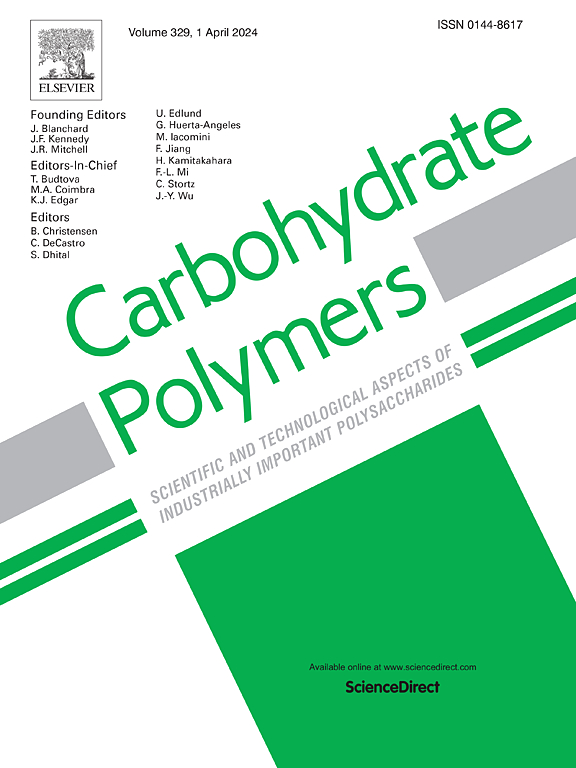Premna microphylla Turcz pectin-modified diosmetin nanoparticles: A galectin-3 targeting strategy for precise colitis intervention
IF 10.7
1区 化学
Q1 CHEMISTRY, APPLIED
引用次数: 0
Abstract
Oral delivery of natural antioxidants represents a promising therapeutic strategy for ulcerative colitis (UC), yet their therapeutic efficacy is hindered by instability and poor accumulation at inflamed sites. To address this, we developed Galectin-3 (Gal-3)-targeted nanoparticles (ZDP-NPs) by encapsulating diosmetin within zein complexes modified with a galactose- and rhamnogalacturonan-I (RG-I)-rich pectin (PMTP, Mw: 228.8 kDa, DM: 34.21 %, RG-I content: 43 %) extracted from Premna microphylla Turcz leaves. Surface plasmon resonance (SPR) analysis confirmed a strong binding affinity between PMTP and Gal-3 (KD = 2.83 μM). ZDP-NPs exhibited uniform spherical morphology (~170 nm), high drug loading (87.9 %) and colloidal stability. Under simulated gastrointestinal conditions, ZDP-NPs showed reduced Dio release (45.6 %) compared to PMTP-free nanoparticles (ZD-NPs, 75.6 %). In vitro studies showed that PMTP surface modification significantly enhanced nanoparticle uptake by LPS-induced macrophages via Gal-3-mediated endocytosis. In vivo colitis experiment of mice revealed that ZDP-NPs selectively accumulated in inflamed colons via Gal-3 targeting, prolonged retention, and significantly alleviated colonic damage by reducing oxidative stress, suppressing pro-inflammatory cytokines, and restoring epithelial barrier integrity. Biocompatibility assays confirmed minimal toxicity of ZDP-NPs. This study presented a food-derived pectin-based nanoplatform for precise colitis intervention through Gal-3 targeting, offering a multifaceted strategy to break the inflammation-oxidative stress cycle.

小叶草果果胶修饰的薯蓣皂苷纳米颗粒:半乳糖凝集素-3靶向策略用于精确的结肠炎干预
口服天然抗氧化剂是治疗溃疡性结肠炎(UC)的一种很有前途的治疗策略,但其治疗效果受到炎症部位不稳定和积累不良的阻碍。为了解决这个问题,我们开发了半乳糖凝集素-3 (Gal-3)靶向纳米颗粒(ZDP-NPs),通过将半乳糖-和鼠李糖半乳糖凝集素- i (RG-I)丰富的果胶(PMTP, Mw: 228.8 kDa, DM: 34.21%, RG-I含量:43%)修饰的玉米蛋白配合物包埋在半乳糖凝集素-3 (Gal-3)内。表面等离子体共振(SPR)分析证实PMTP与Gal-3具有较强的结合亲和力(KD = 2.83 μM)。ZDP-NPs具有均匀的球形形貌(~170 nm)、高载药量(87.9%)和胶体稳定性。在模拟胃肠道条件下,与不含pmtp的纳米颗粒(ZD-NPs, 75.6%)相比,ZDP-NPs的Dio释放量减少(45.6%)。体外研究表明,PMTP表面修饰可通过gal -3介导的内吞作用显著增强lps诱导的巨噬细胞对纳米颗粒的摄取。小鼠体内结肠炎实验表明,ZDP-NPs通过Gal-3靶向在炎症结肠中选择性积累,延长滞留时间,并通过降低氧化应激,抑制促炎细胞因子,恢复上皮屏障完整性,显著减轻结肠损伤。生物相容性试验证实ZDP-NPs毒性极小。本研究提出了一种基于食物来源的果胶的纳米平台,通过Gal-3靶向进行精确的结肠炎干预,提供了一种多方面的策略来打破炎症-氧化应激循环。
本文章由计算机程序翻译,如有差异,请以英文原文为准。
求助全文
约1分钟内获得全文
求助全文
来源期刊

Carbohydrate Polymers
化学-高分子科学
CiteScore
22.40
自引率
8.00%
发文量
1286
审稿时长
47 days
期刊介绍:
Carbohydrate Polymers stands as a prominent journal in the glycoscience field, dedicated to exploring and harnessing the potential of polysaccharides with applications spanning bioenergy, bioplastics, biomaterials, biorefining, chemistry, drug delivery, food, health, nanotechnology, packaging, paper, pharmaceuticals, medicine, oil recovery, textiles, tissue engineering, wood, and various aspects of glycoscience.
The journal emphasizes the central role of well-characterized carbohydrate polymers, highlighting their significance as the primary focus rather than a peripheral topic. Each paper must prominently feature at least one named carbohydrate polymer, evident in both citation and title, with a commitment to innovative research that advances scientific knowledge.
 求助内容:
求助内容: 应助结果提醒方式:
应助结果提醒方式:


